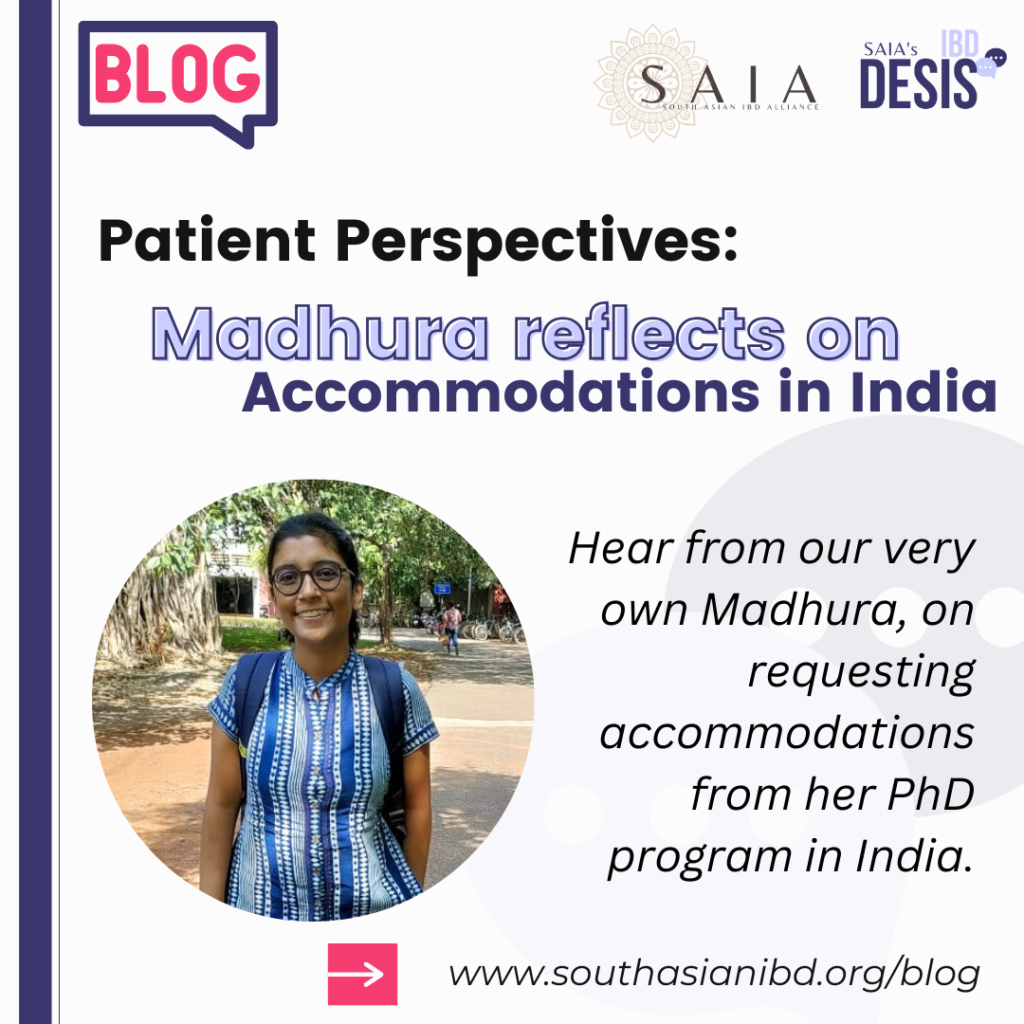
I was diagnosed with Crohn’s disease shortly after I graduated from my Master’s program, and after a two-year break, I am now pursuing a full-time Ph.D. in International Relations. Like many countries, IBD is not legally recognised as a disability that requires accommodations in India, but I believe this should not hold us back from thriving at school. The following strategies for seeking support have made my Ph.D. journey more accessible and rewarding!
Work with your gastroenterologist for better disease control: It is important to get disease activity and symptoms well-controlled to navigate higher education settings with greater ease. Despite having GI symptoms for most of my life, it took many years to receive an IBD diagnosis, and I had to navigate high school, undergraduate and Master’s programs while managing symptoms. It is very hard to focus on your education when you are unwell and do not have a treatment plan in place.
In contrast, I was in remission when I started my Ph.D., and this helped me tackle the program with more confidence. At that time, I created a regular monitoring and follow-up regimen with my GI to ensure that any symptoms that arose were effectively managed, infections were identified and treated quickly, and my IBD was monitored regularly. Though I have been diagnosed with more autoimmune conditions and comorbidities in the last two years, this framework of seeking proactive care helped me prioritize my health while pursuing my Ph.D.
Ask your GI doctor and/or colorectal surgeon for letters to advocate for your needs: On my request, my gastroenterologist has written several letters explaining the severity of my condition and the specific support structures that I need to manage my health. These letters are very helpful when I advocate for accommodations.
Find your point of contact in the university and have an open discussion about your health with them. This could be a professor, your faculty mentor, amedical officer, or even a dean who can help support you through the duration of your program. In my case, it’s my wonderful Ph.D. supervisor who has helped create and advocate for accommodations in a setting where they otherwise wouldn’t exist.
Give this point of contact letters from your doctor and discuss the support that you require. This could be permission to go to the bathroom as often as needed, excused absences for medical procedures, comfortable seating in classrooms, extensions on deadlines when needed, and so on. I found it helpful to reiterate that I am not asking for special privileges nor am I making excuses. I am requesting enabling structures that will help me perform to the best of my abilities. If you feel more comfortable, take your parent along for these conversations. It helps to be proactive and discuss your health at the first available opportunity rather than having a conversation after a health setback. This avoids the additional burden of seeking support when you are sick.
These discussions allow professors and university authorities to understand how to best help you. This is also an opportunity for you to create awareness and ensure IBD patients or others with disabilities who come to your university in the future have an easier time asking for support.
Pro tip: When accommodations are made, thank the person who is helping you. This builds goodwill and encourages authorities to extend more support to you and to students like you.
Navigating peers and friends: Many people do not understand how difficult it is to live with IBD and do not try to learn more. But it is their loss. Those who matter will do the work and they are worth keeping around. Joining patient support groups like the IBDesis Community can also help you find a supportive and friendly space.
Always remember: Each of us has a right to pursue higher education and follow our dreams, even as we cope with our IBD and the challenges it may pose. We deserve to create the scaffolding and support structures that we need to thrive!
Resources
SAIA’s Livestream Talk on Higher Education with IBD
Tina’s Article on Going Back to School while Managing Crohn’s Disease
